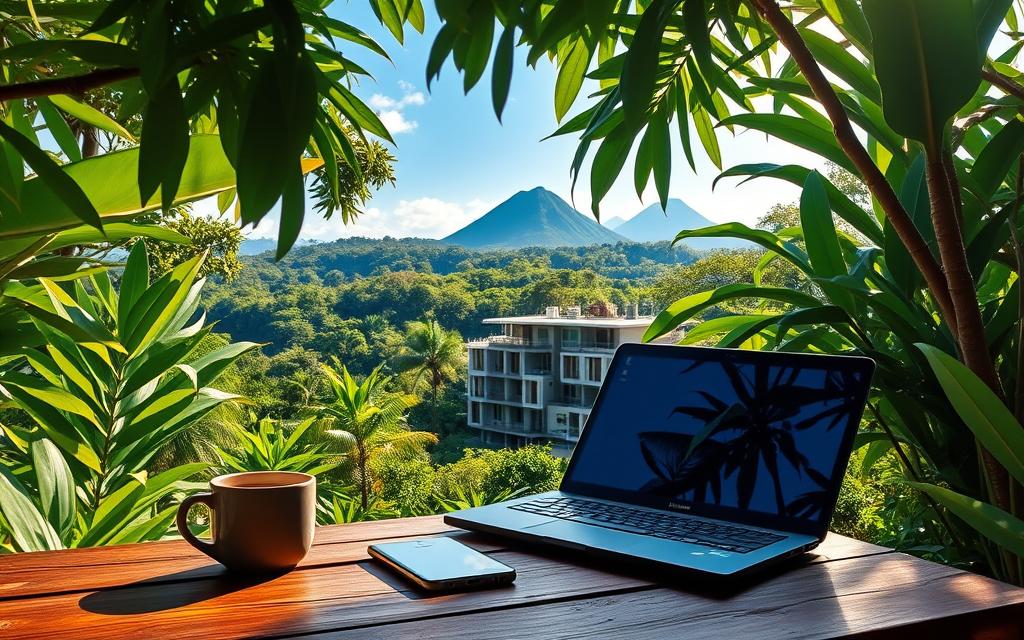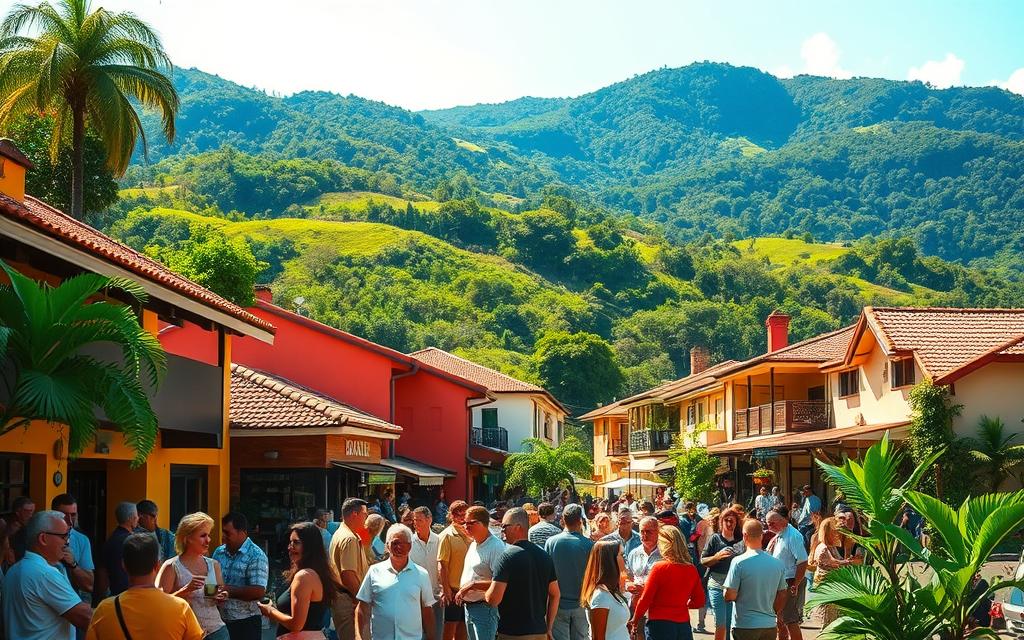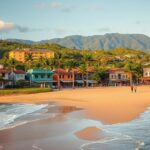Digital nomad visa vs residency Costa Rica: Key Differences

Costa Rica has emerged as a top destination for individuals and families seeking a better quality of life. With its lush landscapes, mild climate, and rich culture, this Central American country is an attractive option for those looking to settle temporarily or permanently.
Since the launch of its digital nomad visa in 2022, thousands of remote workers have been drawn to the country. This innovative program allows professionals to live and work legally in Costa Rica for up to one year. We will explore the key differences between this visa and traditional residency options, helping you determine which path is right for your situation.
Our goal is to provide clear, factual information to help you make an informed decision about which option aligns best with your lifestyle needs and future plans, covering recent updates to both programs for 2025.
Understanding Costa Rica as a Destination for Expats

As we explore the nuances of Costa Rica's immigration policies, it's essential to understand the country's appeal to expats and digital nomads. Costa Rica has become a popular destination due to its unique blend of natural beauty, modern amenities, and a growing expat community.
Why Costa Rica Attracts Digital Nomads and Residents
Costa Rica's appeal lies in its ability to offer a high quality of life, with a relaxed lifestyle, rich culture, and stunning natural beauty. The country provides various residency options, including rentista residency, investment residency, and permanent residency, making it an attractive destination for digital nomads and expats.
Our team has guided thousands of individuals through the immigration process for over 20 years, providing personalized support and simplifying the journey.
The Growing Expat Community in Costa Rica
The expat community in Costa Rica has evolved significantly, growing from primarily retirees to include digital professionals, entrepreneurs, and families seeking alternative lifestyles. Established expatriate communities in areas like Tamarindo, Escazú, and the Central Valley provide support networks for newcomers.
The pandemic accelerated the growth of remote work communities in Costa Rica, with many temporary visitors deciding to pursue more permanent arrangements. Digital nomad hubs have developed in specific regions, creating micro-communities with coworking spaces, networking events, and social gatherings.
Digital Nomad Visa vs Residency in Costa Rica: An Overview

As digital nomads and expats consider Costa Rica as their next destination, understanding the nuances between the digital nomad visa and traditional residency options becomes crucial. Costa Rica offers a variety of residency options to suit different needs and circumstances.
What is the Costa Rica Digital Nomad Visa?
The Costa Rica digital nomad visa is designed for remote workers who wish to live in Costa Rica temporarily. This visa category allows digital nomads to stay in the country for an extended period, provided they meet specific income and insurance requirements.
To be eligible, applicants must demonstrate a minimum monthly income from a reliable source outside of Costa Rica and have valid health insurance that covers them in the country.
What are Traditional Residency Options?
Costa Rica offers several traditional residency categories, including Rentista, Pensionado, and Inversionista. These options are designed for individuals seeking longer-term or permanent settlement in Costa Rica.
The Rentista category is ideal for those with a stable income, while Pensionado is suited for retirees. Inversionista is perfect for investors looking to contribute to Costa Rica's economy through business investments.
These traditional residency options can eventually lead to permanent residency status and potentially citizenship, representing a more comprehensive immigration pathway.
The Costa Rica Digital Nomad Visa Explained

Costa Rica has joined the ranks of countries catering to digital nomads, offering a specialized visa that simplifies the process of living and working there. This visa is designed to attract remote workers who can support themselves financially and contribute to the local economy without burdening the country's social systems.
Eligibility Requirements for Digital Nomads
To be eligible for the Costa Rica digital nomad visa, applicants must demonstrate that they have a stable income from a foreign source. This can include employment income, freelance work, or business profits. The specific documentation required to prove income includes bank statements showing consistent deposits over the previous 12 months. For freelancers with variable income, meeting the requirements might involve showing higher average earnings or supplementary savings.
The eligibility criteria are designed to ensure that digital nomads can support themselves during their stay in Costa Rica. By requiring applicants to show proof of stable income, the government can be confident that these individuals will not become a financial burden on the state.
Income and Insurance Requirements
The Costa Rica digital nomad visa comes with specific financial and insurance requirements. Applicants must maintain private health insurance that covers them for the duration of their stay. The insurance policy must provide a minimum coverage of $50,000 USD for medical expenses. Both international and local insurance providers are accepted, as long as they cover medical care in Costa Rica.
In addition to health insurance, applicants must also demonstrate that they have a stable income. This can be achieved by providing bank statements or other financial documents that show a consistent income stream. The income requirement is in place to ensure that digital nomads can support themselves financially while living in Costa Rica.
Traditional Residency Options in Costa Rica

Beyond the digital nomad visa, Costa Rica provides several traditional residency categories tailored to different lifestyles and investment capabilities. These options offer a pathway to a more permanent life in this vibrant Central American country.
Rentista (Fixed Income) Residency
The Rentista residency is designed for individuals who have a stable income from a reliable source outside of Costa Rica. To qualify, applicants must demonstrate a minimum monthly income of $2,500 from a pension, rental properties, or other stable sources. This income requirement can be met through various financial instruments, including pensions, annuities, or investments that generate a steady income stream. Rentista residency is valid for two years and can be renewed for additional two-year periods.
Pensionado (Retiree) Residency
Pensionado residency is geared towards retirees who receive a pension from a qualified source. Applicants must show a minimum monthly pension of $1,000, with an additional $250 for each dependent. This category offers various incentives, including discounts on various services and goods, making it an attractive option for retirees. Like other residency categories, Pensionado status is initially granted for two years and is renewable.
Inversionista (Investor) Residency
The Inversionista residency category is designed for individuals willing to make a significant investment in Costa Rica's economy. The minimum investment requirement is $150,000, which can be directed towards various approved investment vehicles, including real estate, business startups, or forestry projects. To qualify, the investment must be maintained throughout the residency period and verified during renewals. This residency path not only offers a chance to live in Costa Rica but also the potential for business development and investment returns in the country's growing economy.
Inversionista status, like other traditional residency categories, can lead to permanent residency after three years and potentially citizenship after seven years, making it a viable long-term option for those looking to deeply integrate into Costa Rican society.
Family-Based Residency Options

If you have family in Costa Rica, you may be eligible for a special residency category. Costa Rica's residency policies are designed to be inclusive, allowing individuals with family ties to the country to apply for residency.
Residency Through Costa Rican Family Ties
For individuals with Costa Rican family ties, obtaining residency can be a straightforward process. This category is particularly beneficial for those who have spouses, children, or parents who are Costa Rican citizens. To qualify, applicants must provide documentation proving their family relationship, such as marriage certificates or birth certificates. We will outline the necessary documents and the application process for this category.
Including Family Members in Your Application
One of the key advantages of Costa Rica's residency options is the ability to include family members in the application. This applies to both digital nomad visa applicants and traditional residency applicants. Family members typically include spouses and children under 25, and sometimes dependent parents. When including family members, additional documentation such as marriage certificates, birth certificates, and proof of economic dependency may be required. We will discuss how family members receive the same status as the primary applicant and the financial requirements that apply when including dependents in the application.
Application Process Comparison

To make an informed decision about moving to Costa Rica, it's essential to understand the differences in the application processes for Digital Nomad Visas and traditional residency. The process varies significantly between the two, with different requirements and timelines.
Digital Nomad Visa Application Steps
The application process for a Digital Nomad Visa is relatively streamlined. To apply, you'll need to provide twelve months of bank statements, proof of health insurance, and a completed application form. This process is designed to be straightforward, allowing digital nomads to quickly begin their stay in Costa Rica.
Traditional Residency Application Process
In contrast, the traditional residency application process is more detailed. It includes additional steps such as background checks and proof of financial stability. Applicants typically need to provide extensive documentation, including apostilled birth certificates, police records, and marriage certificates where applicable. Many applicants work with immigration attorneys or consultants to navigate these complex requirements.
The submission process for traditional residency is generally done in person at immigration offices or through authorized legal representatives. After submission, there's a verification period that can last from 3 to 12 months, depending on the residency category and application completeness. Post-approval, applicants must register with the CCSS (Costa Rican Social Security), obtain a DIMEX card, and fulfill any category-specific obligations.
Documentation Requirements
Gathering the right documents is crucial for a smooth residency application process in Costa Rica. Whether you're applying for a Digital Nomad Visa or traditional residency, the documentation requirements are a critical component of your application.
Documents Needed for Digital Nomad Visa
For a Digital Nomad Visa, applicants must provide specific documents to support their application. These include a valid passport, proof of health insurance that covers the applicant in Costa Rica, and documentation showing a minimum income from a remote job or business. We recommend ensuring all bank statements are clear and up-to-date, as these are crucial for proving financial stability.
Health certifications are another area where errors often occur. Verify that your health insurance meets local requirements and covers the necessary duration. Additionally, applicants must provide a police record from their home country or any country where they've resided in the past three years.
Documents Needed for Traditional Residency
Traditional residency applications in Costa Rica require more extensive documentation compared to the Digital Nomad Visa. Category-specific documents are necessary, such as proof of pension income for Pensionado applicants, investment documentation for Inversionista applicants, and guaranteed income proof for Rentista applicants.
Personal documentation is also required, including birth certificates, marriage certificates (if applicable), and police records from all countries of residence in the past three years. All non-Spanish documents must be officially translated by certified translators. Furthermore, documents must be apostilled or legalized by Costa Rican consulates abroad, adhering to authentication requirements.
Financial documentation is critical to demonstrate that applicants meet the specific income or investment thresholds for their chosen residency category. Ensuring that all financial documents are accurate and complete is vital to avoid delays in the application process.
Processing Times and Renewal Procedures
For those seeking residency in Costa Rica, grasping the processing times and renewal procedures is vital for a smooth application process. Residency in Costa Rica opens doors to permanent residency after three years, offering a pathway to stability and a long-term home.
Digital Nomad Visa Timeline
The digital nomad visa application process is generally faster than traditional residency. Applicants can expect a processing time of approximately 3 to 6 months. Factors influencing this timeline include the completeness of the application and the workload of the immigration department.
Traditional Residency Timeline
Traditional residency applications typically take longer to process, with timelines ranging from 6 to 12 months or more, depending on the category of residency. For instance, applying for residency in Costa Rica through the pensionado or rentista categories may have different processing times due to varying documentation requirements.
Renewal procedures for traditional residency occur every two years until the applicant is eligible for permanent residency. After three years of temporary residency, individuals can apply for permanent residency, marking a significant step towards long-term stability in Costa Rica.
To manage the waiting period effectively, it's advisable to work with legal representatives who can monitor the application's status and address any issues that arise during processing.
Cost Comparison
As you plan your move to Costa Rica, it's essential to compare the costs associated with the Digital Nomad Visa and traditional residency options.
Digital Nomad Visa Costs
The Digital Nomad Visa has a relatively straightforward cost structure. For a single applicant handling everything themselves, expect to spend between $500-700 in total fees. Using a lawyer or visa service will add $300-800 to this total, but often results in faster approval and fewer headaches. According to a survey of 200 digital nomad visa holders conducted in January 2025, the average total cost was $750 for self-managed applications and $1,300 for those using legal assistance.
Traditional Residency Expenses
Traditional residency applications in Costa Rica often involve higher fees and financial commitments compared to the Digital Nomad Visa. Government filing fees for different residency categories typically range from $250-400. Additionally, there are substantial financial requirements that function as investments rather than fees, such as the $60,000 bank deposit for Rentista applicants or the $150,000 investment for Inversionista applicants.
Professional service costs are also a consideration, as traditional residency applications more commonly require legal assistance, costing between $800-1,500. Ongoing financial obligations include mandatory CCSS (Costa Rican Social Security) payments, which start at approximately $75-150 monthly, depending on income level.
Tax Implications
Understanding the tax implications of living in Costa Rica is crucial for both digital nomads and traditional residents. Costa Rica's territorial tax system generally only taxes income generated within the country, providing significant advantages for those with foreign income sources.
Tax Benefits of the Digital Nomad Visa
The digital nomad visa offers favorable tax conditions, particularly for foreign-earned income. Holders of this visa can benefit from reduced tax liabilities, making it easier to manage finances while enjoying the local lifestyle. For more detailed information on how digital nomads are taxed in Costa Rica, you can visit this resource.
Additionally, the territorial tax system means that income earned outside of Costa Rica is not subject to local taxation, providing a significant advantage for digital nomads with international income streams.
Tax Considerations for Traditional Residents
Traditional residents, on the other hand, may become tax residents of Costa Rica after establishing sufficient physical presence. This can affect their tax status in their home countries and potentially subject their worldwide income to Costa Rican taxation.
Furthermore, traditional residents are required to make mandatory social security contributions (CCSS), regardless of whether they use the public healthcare system. Certain residency categories may also be eligible for tax benefits, such as import tax exemptions for household goods and vehicles.
Rights and Restrictions
As digital nomadism and residency in Costa Rica become more popular, it's essential to explore the associated rights and restrictions. Costa Rica offers a unique blend of lifestyle and legal framework that attracts both digital nomads and those seeking residency.
What Digital Nomads Can and Cannot Do
Digital nomads in Costa Rica, under the digital nomad visa, have specific rights and limitations. They are allowed to live and work remotely in Costa Rica for a specified period. However, they are not permitted to engage in local employment or start a business without additional permits. They can drive with a homologated license and open bank accounts, but they are not covered under the public healthcare system unless they opt for private insurance.
Rights and Limitations of Traditional Residents
Traditional residents in Costa Rica enjoy more comprehensive rights, including the ability to come and go freely, access to public healthcare through the CAJA system, and the right to drive with a homologated license. They can also open bank accounts, purchase real estate, and eventually apply for work permits, allowing them to legally work for Costa Rican employers or start local businesses. However, they must join the CCSS system, which is a mandatory monthly expense. While temporary residents have certain limitations, such as voting restrictions, these diminish with permanent residency.
Understanding these rights and restrictions is crucial for making an informed decision about whether to opt for a digital nomad visa or traditional residency in Costa Rica.
Pathway to Permanent Residency
For those considering a long-term stay in Costa Rica, navigating the path to permanent residency is essential. Costa Rica offers various residency categories, some of which lead to permanent residency after a specified period.
Can Digital Nomad Visa Lead to Permanent Status?
The Digital Nomad Visa in Costa Rica is designed for remote workers and digital entrepreneurs. However, it does not directly lead to permanent residency. To achieve permanent status, individuals typically need to transition to a traditional residency category that qualifies for permanent residency after three years.
Timeline for Traditional Residency to Permanent Status
Several traditional residency categories in Costa Rica, such as Rentista, Pensionado, and Inversionista, can lead to permanent residency after three years. This timeline allows individuals to establish strong ties to the country, comply with residency requirements, and eventually apply for permanent status. After holding permanent residency for an additional four years, some individuals may be eligible for citizenship by residence, totaling seven years of residency.
Maintaining residency status throughout the process is crucial, including compliance with CCSS payments and minimum stay requirements. Understanding the pathway and requirements for permanent residency in Costa Rica is vital for those planning a long-term or permanent stay in this beautiful country.
Healthcare Access and Insurance
Healthcare access in Costa Rica varies significantly between digital nomads and residents. Understanding these differences is crucial for making informed decisions about your healthcare needs.
Healthcare Options for Digital Nomads
Digital nomads in Costa Rica have different healthcare options compared to traditional residents. For those considering Costa Rica as a destination, it's essential to explore health insurance options that cater to their needs. Private insurance is a common choice, offering flexibility and coverage that suits various requirements.
Healthcare System Access for Residents
Traditional residents in Costa Rica are required to join the CCSS (Caja Costarricense de Seguro Social) system, which provides comprehensive healthcare coverage. The CCSS system is funded through monthly payments based on reported income, ensuring that residents have access to a wide range of medical services, prescriptions, and procedures. While the public system offers many benefits, including no pre-existing condition exclusions, residents often combine CCSS coverage with private insurance for faster service or specific healthcare needs.
Navigating the Costa Rican healthcare system as a resident involves registering with local clinics (EBAIS) and understanding referral processes. This integration into the public healthcare system is a significant aspect of residency in Costa Rica.
Banking and Financial Considerations
As digital nomads and expats explore Costa Rica, navigating the local banking system becomes an essential step in their relocation journey. Costa Rica remains largely cash-based outside tourist areas, making it advisable to maintain accounts in both US dollars and the local currency, colones, for maximum flexibility.
Banking Options for Digital Nomads
For digital nomads, setting up a local bank account can save an average of $300 annually in transaction fees, as noted by James Rodriguez, a financial advisor specializing in expat banking. More importantly, it simplifies rent payments and utility bills that often don't accept international cards. Digital nomads can explore various banks in Costa Rica that cater to their needs, though the range of services might be limited compared to those available to residents.
Financial Services Available to Residents
Traditional residents in Costa Rica have access to a broader range of financial services, including credit products, mortgages, investment accounts, and business banking. To fully integrate into the Costa Rican financial system, residents must establish a local credit history and qualify for local financial products. Residents can also participate in various investment opportunities such as real estate financing and retirement planning. For more information on banking options, visit Jaros CR.
Additionally, residents need to be aware of tax considerations for their financial accounts both in Costa Rica and abroad, including potential reporting requirements. Managing finances effectively during the transition from a foreign resident to an integrated local resident involves strategies for transferring assets and establishing financial stability.
Which Option Is Right for You?
Understanding whether the digital nomad visa or traditional residency is right for you requires examining your financial situation, lifestyle, and future plans. According to the Costa Rica Immigration Experts (CRIE), considering your income sources and long-term goals is crucial.
Ideal Candidates for Digital Nomad Visa
The digital nomad visa is ideal for individuals who work remotely and have a stable income from outside Costa Rica. This visa is suitable for those who wish to experience living in Costa Rica without immediately committing to traditional residency. It's perfect for digital nomads who want to enjoy the country's lifestyle and culture while maintaining their remote work.
Typically, ideal candidates are those who are not planning to stay in Costa Rica indefinitely and prefer the flexibility that the digital nomad visa offers.
When Traditional Residency Makes More Sense
Traditional residency is more suitable for individuals planning to live in Costa Rica for an extended period or indefinitely. This includes those seeking eventual permanent residency or citizenship, individuals who wish to integrate fully into Costa Rican society, and those planning to work locally or start a business.
It's also the better choice for retirees, investors, and entrepreneurs who plan to establish local business connections or retire in Costa Rica, as it provides access to the public healthcare system and potential property investment advantages.
Conclusion
The decision between a digital nomad visa and traditional residency in Costa Rica hinges on your long-term goals and lifestyle aspirations. As we have explored, both paths offer unique benefits tailored to different needs.
The digital nomad visa is ideal for remote workers seeking a temporary tropical lifestyle, offering tax benefits, a simplified application process, and the flexibility to work from anywhere in Costa Rica. On the other hand, traditional residency paths provide a pathway to permanent status, fuller integration into Costa Rican society, and more comprehensive rights over time.
When choosing between these options, it's essential to consider your financial situation, desired lifestyle, and long-term goals. Whether you're drawn to the flexibility of the digital nomad visa or the stability of traditional residency, aligning your choice with your aspirations is crucial.
For those ready to take the next step, we offer professional guidance to navigate the application process. Our team is here to help you achieve your dream of living in Costa Rica. You can reach us at www.jaroscr.com, info@jaroscr.com, or +(506)7182-8969 for personalized assistance with your Costa Rica immigration journey.
In conclusion, Costa Rica's welcoming environment and diverse immigration options make it an attractive destination for digital nomads and traditional residents alike. By understanding the differences between the digital nomad visa and traditional residency, you can make an informed decision that suits your lifestyle and goals, ensuring a fulfilling experience in this beautiful country.


